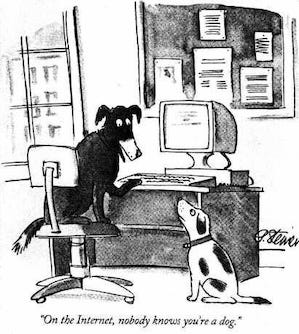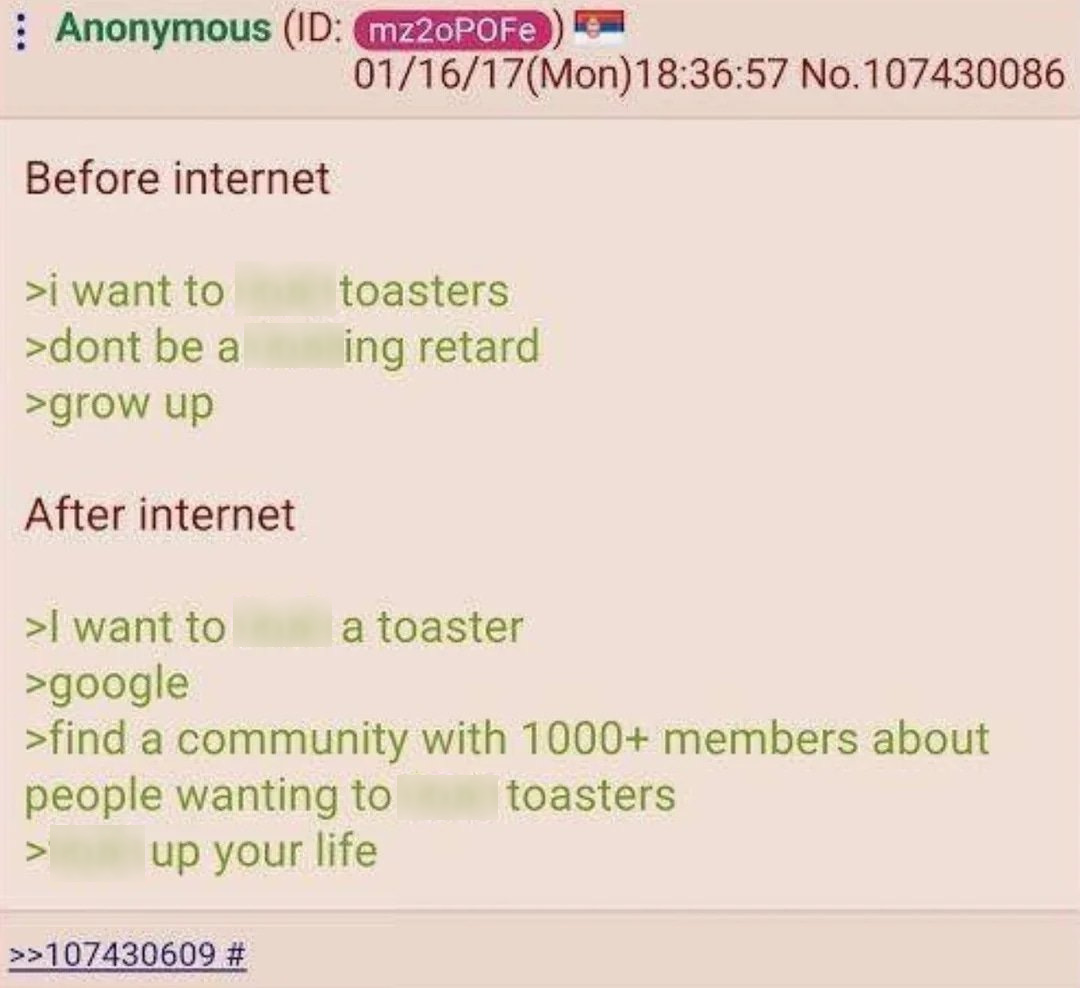Online Identity
Who are we really?
My great-grandfather spent decades working in a paper mill. On the job, he was Art, manager of the finishing room. At home, he was Arthur, family patriarch. One man, but different identities. He was the same person deep inside, with the same values, but he put on different hats depending on the situation.
That sort of thing has always been normal. But today the internet has allowed people to create a wide variety of identities that have little—or nothing—to do with reality.
Back in 1993, in the World Wide Web’s infancy, cartoonist Peter Steiner published a famous drawing in The New Yorker:
“On the Internet, nobody knows you’re a dog.” Today, you never know who is on the other side of your phone screen. The pretty girl sliding into your DMs is more likely a scammer from India or Nigeria. The seemingly patriotic “heritage America” account could well be run from a foreign country. The person replying to all your tweets might not even be human, but an AI chatbot.
I’m not against anonymity—after all, our Founding Fathers waged an information war using pseudonyms. But there’s a difference between adopting a pseudonym and completely reinventing your identity. Some of the most interesting people on Twitter, such as Fischer King, are pseudonymous, and when a right-leaning pseudonymous thinker is doxed—as with Lomez or Raw Egg Nationalist—it usually turns out that the person behind the name is exactly what they claimed to be. Pseudonymity lets us engage with ideas rather than personalities.
What is insidious, however, is the way internet anonymity can warp the minds of our children. An old post from 4chan (itself a sea of degeneracy, albeit with the occasional pearl of wisdom) once explained how the internet changed society:
The internet is an amazing tool for building community. Thirty years ago, I would have been writing freelance articles for a local newspaper or magazine with access to only a fraction of the information I now have at my fingertips. Yet it also allows people to retreat into bubbles that disconnect them from the real world. Dressing up as the opposite sex—or as an animal—was once a very niche mental illness. Today, there are entire communities of trans-identifying people and so-called furries, with enough cultural reach to influence national policy.
Columnist Scott Greer wrote an insightful piece in The American Conservative last week about internet identities:
All you are on the internet is an avi and a name of your choosing. You can present yourself as an anime girl, a hardened guerrilla fighter, a stormtrooper, or a black guy if you so choose. It’s all up to the individual. Off the internet, the anime girl is still a man, the hardened guerrilla fighter is still a desk jockey, the stormtrooper is still a handicapped Mexican, and the black guy is still a white dude. These identities don’t exist outside, but that’s not an insurmountable obstacle if you live online.
It can be harmless if these identities just remain some form of LARPing and people don’t try to make their online identity real. But transgenders show that many can take it to the extreme. In a normal world, an extremely small number of men would ever consider themselves women and vice versa. No one around them would pretend that they are actually women. With the internet, now hundreds of thousands of Americans fall victim to this delusion and try to make real the fake personas they create online. It leads to horrifying results, with middle-aged bald men dressing up as schoolgirls and other disgusting behavior. Worst of all, they force the rest of society to indulge their fantasies. It doesn’t matter if the “trans woman” has a beard and a husky voice. You’re supposed to call him “her.”
I came of age in the heyday of internet forums, the successors of old dial-up bulletin boards and the forerunners of modern social media. There were people I knew only by their avatars—often movie or video game characters—and their posts. I never met them in real life, but I came to know them by their words and ideas.
This probably sounds strange to those older than me, yet obvious to those younger. Perceptions of the internet now form a major generational divide.
When I began writing about politics online, I made a conscious choice not to be anonymous. Having been self-employed for most of the past seven years, I never feared losing a job over what I wrote. I think those who know me personally would agree that I’m the same person online as I am offline. My written words are more refined than what I say off the cuff, but they reflect the same ideals and values. I’ve never pretended to be anything or anyone I’m not.
That’s why it’s so important to be discerning in what we consume online. Every day I see viral posts full of falsehoods or half-truths that people share without thinking. I often report accounts impersonating local political figures, or block trolls running disturbing parody accounts.
And of course, many public figures cultivate very different personas on social media than they do in real life. That goes both ways—some who are affable and kind face-to-face are nasty trolls online, while others who seem aggressive on Twitter are actually some of the kindest people you’ll ever meet.
Last year I predicted that the next great debate in American society would center on identity: what it means to be male or female, what it means to be an American, and what it means to be a human being. Make sure you and your children are well grounded as we enter this uncharted territory of existence.
It’s up to you to discern what is real and what is fake. Most importantly, raise your children so that their identities are rooted in what is real—not in the projections of nameless, faceless figures online. Ground them in your family, in your heritage, and above all in God. That way, when they step out into a world of wolves, they will be confident in who they are, resisting every attempt to remake them in someone else’s image.



